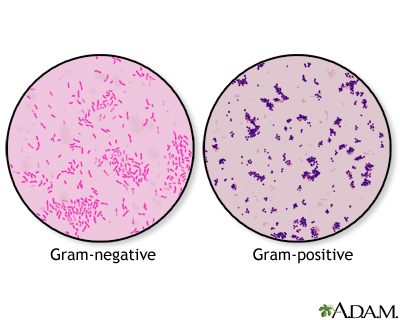Stool Gram stain
Gram stain of stool; Feces Gram stain
A stool Gram stain is a laboratory test that uses different chemical stains to detect and identify bacteria in a stool sample.
The Gram stain method is sometimes used to quickly diagnose bacterial infections.
Images

How the Test is Performed
You will need to collect a stool sample.
There are many ways to collect the sample.
- You can catch the stool on plastic wrap that is loosely placed over the toilet bowl and held in place by the toilet seat. Then you put the sample in a clean container.
- A test kit is available that supplies a special toilet tissue that you use to collect the sample. After collecting the sample, you put it in a container.
- Do not take stool samples from the water in the toilet bowl. Doing this can cause an inaccurate test result.
Do not mix urine, water, or toilet tissue with the sample.
For children wearing diapers:
- Line the diaper with plastic wrap.
- Position the plastic wrap so that it will prevent urine and stool from mixing. This will provide a better sample.
Your health care provider will give you instructions on when and how to return the sample.
The sample is sent to a laboratory. A small amount is spread in a very thin layer on a glass slide. This is called a smear. A series of special stains are added to the sample. The lab team member looks at the stained smear under the microscope to check for bacteria. The color, size, and shape of the cells help identify the specific bacteria.
How the Test will Feel
A lab smear is painless and does not directly involve the person who is being tested.
There is no discomfort when a stool sample is collected at home because it only involves normal bowel functions.
Why the Test is Performed
Your provider may order this test to help diagnose an intestinal infection or illness, sometimes involving diarrhea.
Normal Results
A normal result means only normal or "friendly" bacteria were seen on the stained slide. Everyone has "friendly" bacteria in their intestines.
Normal value ranges may vary slightly among different laboratories. Talk to your provider about the meaning of your specific test results.
What Abnormal Results Mean
An abnormal result means that an intestinal infection may be present. Stool cultures and other tests can also help diagnose the cause of the infection.
Risks
There are no risks.
Related Information
DiarrheaBacterial gastroenteritis
References
Allos BM. Campylobacter infections. In: Goldman L, Schafer AI, eds. Goldman-Cecil Medicine. 26th ed. Philadelphia, PA: Elsevier; 2020:chap 287.
Allos BM, Blaser MJ, Iovine NM, Kirkpatrick BD. Campylobacter jejuni and related species. In: Bennett JE, Dolin R, Blaser MJ, eds. Mandell, Douglas, and Bennett's Principles and Practice of Infectious Diseases. 9th ed. Philadelphia, PA: Elsevier; 2020:chap 216.
Drancourt M. Acute diarrhea. In: Cohen J, Powderly WG, Opal SM, eds. Infectious Diseases. 4th ed. Philadelphia, PA: Elsevier; 2017:chap 38.
Plourde AR, Beavis KG. Specimen collection and handling for diagnosis of infectious diseases. In: McPherson RA, Pincus MR, eds. Henry's Clinical Diagnosis and Management by Laboratory Methods. 24th ed. Philadelphia, PA: Elsevier; 2022:chap 66.
BACK TO TOPReview Date: 12/4/2022
Reviewed By: Jatin M. Vyas, MD, PhD, Associate Professor in Medicine, Harvard Medical School; Associate in Medicine, Division of Infectious Disease, Department of Medicine, Massachusetts General Hospital, Boston, MA. Also reviewed by David C. Dugdale, MD, Medical Director, Brenda Conaway, Editorial Director, and the A.D.A.M. Editorial team.

Health Content Provider
06/01/2025
|
A.D.A.M., Inc. is accredited by URAC, for Health Content Provider (www.urac.org). URAC's accreditation program is an independent audit to verify that A.D.A.M. follows rigorous standards of quality and accountability. A.D.A.M. is among the first to achieve this important distinction for online health information and services. Learn more about A.D.A.M.'s editorial policy, editorial process and privacy policy. A.D.A.M. is also a founding member of Hi-Ethics. This site complied with the HONcode standard for trustworthy health information from 1995 to 2022, after which HON (Health On the Net, a not-for-profit organization that promoted transparent and reliable health information online) was discontinued. |
The information provided herein should not be used during any medical emergency or for the diagnosis or treatment of any medical condition. A licensed medical professional should be consulted for diagnosis and treatment of any and all medical conditions. Links to other sites are provided for information only -- they do not constitute endorsements of those other sites. © 1997- 2024 A.D.A.M., a business unit of Ebix, Inc. Any duplication or distribution of the information contained herein is strictly prohibited.
